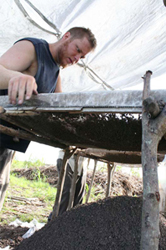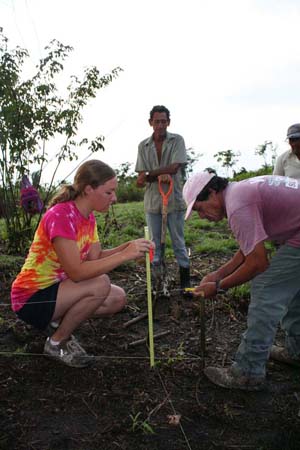By (November 3, 2008)
Costa Rica Field School Students Dig into the Past
 |
| UAlbany graduate student Sean Higgins sifting for artifacts on a recent field school in Belize. (Photo courtesy Robert Rosenswig) |
"For some of these students," said the assistant professor of anthropology, "it's their first time in the developing world. Possibly their first time outside the U.S."
It's a measure of his worldview that Rosenswig emphasizes personal growth as much as the practical experience students take away from these highly specialized study abroad programs.
Sarah Kraft, a sophomore from Averill Park, N.Y., attended last year's field school in Belize, and will be front and center in the upcoming spring program. "What I love about field school is being able to interact with the local people who live in the village. I'm excited to be able to experience all this again in Costa Rica, in a new setting and learning about another culture," said the anthropology major.
The next archaeological field school will be held Jan. 11 to Feb. 22, 2009 at Las Mercedes, Costa Rica.
Las Mercedes, located in the central Caribbean region of Costa Rica, dates back to A.D. 1000, and was most likely the center of a powerful paramount chief's political territory. It's a village, but a major village of its time, with paved causeways linking its central monuments to outlying settlements nearly a mile away. The artifact-rich site has been excavated since Costa Rica's 19th-century colonial period and numerous stone sculptures and objects have been recovered.
While students from any major are allowed to participate in the field schools, for some it marks the emergence of a life's path. April Anne Maser, a senior anthropology major from Hunter, N.Y., first attended a Rosenswig archaeological field school in Belize.

|
| UAlbany sophomore Sarah Kraft, left, explores the archaeological site in San Estevan, Belize. Kraft will head to Costa Rica for another field school in the spring. (Photo courtesy Robert Rosenswig) |
Kraft echoes similar sentiments. "Besides having to get up early everyday, I loved everything about being in the field. After just a few days I realized that this was something I could see myself doing with my life," she said.
Rosenswig emphasizes the practical as another goal of the field school. By the time the students leave the six-week Las Mercedes project, he said, "They will know the basics of how to excavate and responsibly document what they've found. They'll be qualified actually to get a starting job in archaeology anywhere in the world."
Over the last 10 years, more than 170 UAlbany undergraduates and 50 graduate students have joined eight UAlbany field schools, including an ancient Roman encampment in Serbia and the site of an Iroquois longhouse in Schoharie, N.Y. For more on UAlbany's study abroad and international programs, visit the Office of International Education.
Please send questions comments about the
University News
site to:
mediarelations@uamail.albany.edu
mediarelations@uamail.albany.edu
